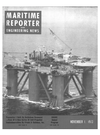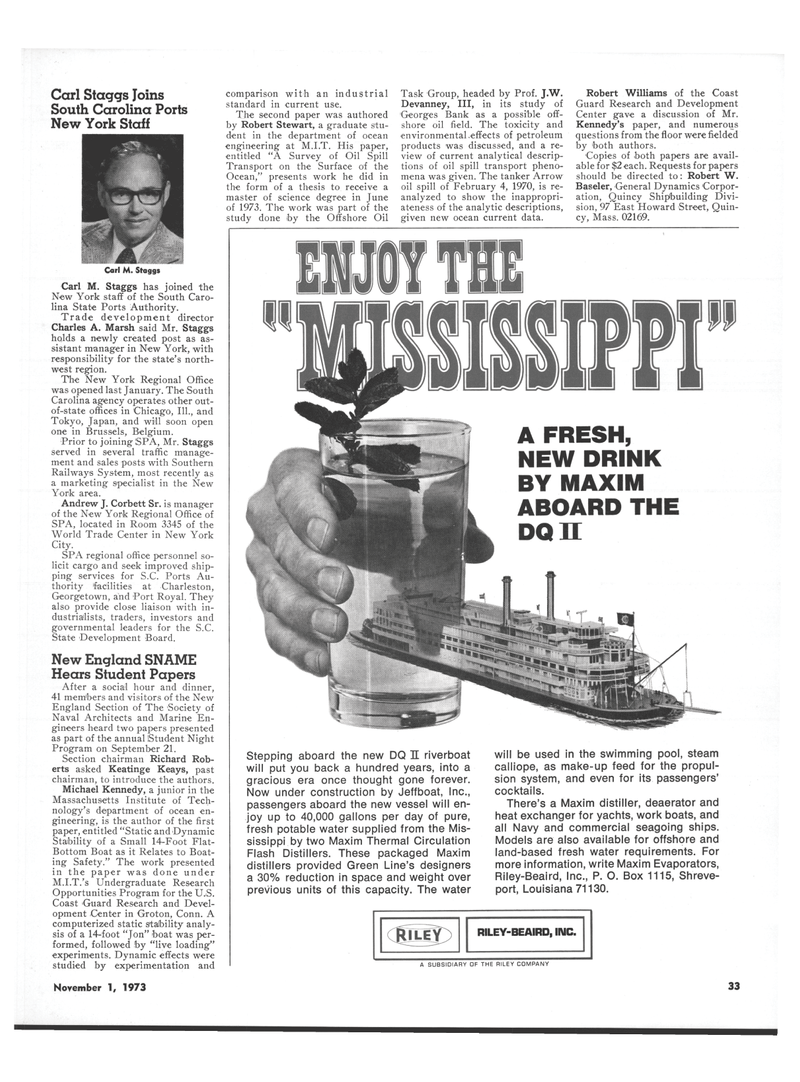
Page 27: of Maritime Reporter Magazine (November 1973)
Read this page in Pdf, Flash or Html5 edition of November 1973 Maritime Reporter Magazine
Carl Staggs Joins
South Carolina Ports
New York Staff
Carl M. Staggs
Carl M. Staggs has joined the
New York staff of the South Caro- lina State Ports Authority.
Trade development director
Charles A. Marsh said Mr. Staggs holds a newly created post as as- sistant manager in New York, with responsibility for the state's north- west region.
The New York Regional Office was opened last January. The South
Carolina agency operates other out- of-state offices in Chicago, 111., and
Tokyo, Japan, and will soon open one in Brussels, Belgium.
Prior to joining SPA, Mr. Staggs served in several traffic manage- ment and sales posts with Southern
Railways System, most recently as a marketing specialist in the New
York area.
Andrew J. Corbett Sr. is manager of the New York Regional Office of
SPA, located in Room 3345 of the
World Trade Center in New York
City.
SPA regional office personnel so- licit cargo and seek improved ship- ping services for S.C. Ports Au- thority facilities at Charleston,
Georgetown, and Port Royal. They also provide close liaison with in- dustrialists, traders, investors and governmental leaders for the S.C.
State Development Board.
New England SNAME
Hears Student Papers
After a social hour and dinner, 41 members and visitors of the New
England Section of The Society of
Naval Architects and Marine En- gineers heard two papers presented as part of the annual Student Night
Program on September 21.
Section chairman Richard Rob- erts asked Keatinge Keays, past chairman, to introduce the authors.
Michael Kennedy, a junior in the
Massachusetts Institute of Tech- nology's department of ocean en- gineering, is the author of the first paper, entitled "Static and Dynamic
Stability of a Small 14-Foot Flat-
Bottom Boat as it Relates to Boat- ing Safety." The work presented in the paper was done under
M.I.T.'s Undergraduate Research
Opportunities Program for the U.S.
Coast Guard Research and Devel- opment Center in Groton, Conn. A computerized static s'taJbility analy- sis of a 14-foot "Jon" boat was per- formed, followed by "live loading" experiments. Dynamic effects were studied by experimentation and comparison with an industrial standard in current use.
The second paper was authored by Robert Stewart, a graduate stu- dent in the department of ocean engineering at M.I.T. His paper, entitled "A Survey of Oil Spill
Transport on the Surface of the
Ocean," presents work he did in the form of a thesis to receive a master of science degree in June of 1973. The work was part of the study done by the Offshore Oil
Task Group, headed by Prof. J.W.
Devanney, III, in its study of
Georges Bank as a possible off- shore oil field. The toxicity and environmental-effects of petroleum products was discussed, and a re- view of current analytical descrip- tions of oil spill transport pheno- mena was given. The tanker Arrow oil spill of February 4, 1970, is re- analyzed to show the inappropri- ateness of the analytic descriptions, given new ocean current data.
Robert Williams of the Coast
Guard Research and Development
Center gave a discussion of Mr.
Kennedy's paper, and numerous questions from the floor were fielded by both authors. •Copies of both papers are avail- able for $2 each. Requests for papers should be directed to: Robert W.
Baseler, General Dynamics Corpor- ation, Quincy Shipbuilding Divi- sion, 97 East Howard Street, Quin- cy, Mass. 02169. mm•
A FRESH,
NEW DRINK
BY MAXIM
ABOARD THE
DQH
Stepping aboard the new DQ H riverboat will put you back a hundred years, into a gracious era once thought gone forever.
Now under construction by Jeffboat, Inc., passengers aboard the new vessel will en- joy up to 40,000 gallons per day of pure, fresh potable water supplied from the Mis- sissippi by two Maxim Thermal Circulation
Flash Distillers. These packaged Maxim distillers provided Green Line's designers a 30% reduction in space and weight over previous units of this capacity. The water will be used in the swimming pool, steam calliope, as make-up feed for the propul- sion system, and even for its passengers' cocktails.
There's a Maxim distiller, deaerator and heat exchanger for yachts, work boats, and all Navy and commercial seagoing ships.
Models are also available for offshore and land-based fresh water requirements. For more information, write Maxim Evaporators,
Riley-Beaird, Inc., P. O. Box 1115, Shreve- port, Louisiana 71130.
RILEY-BEAIRD, INC.
A SUBSIDIARY OF THE RILEY COMPANY
November 1, 1973 33

 26
26

 28
28
